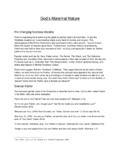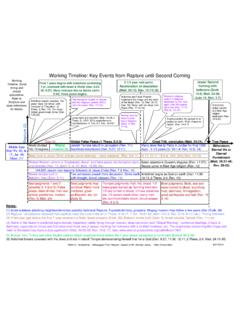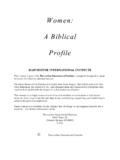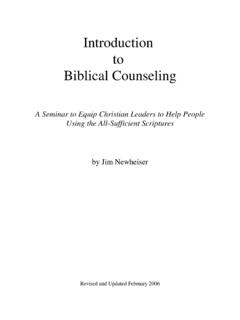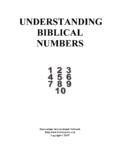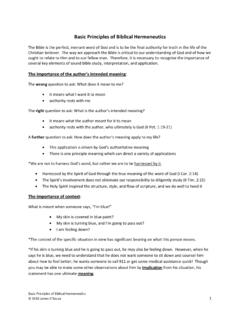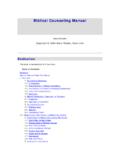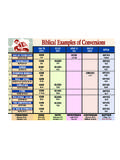Transcription of The Eucharist: A Biblical Review - Eternal Productions
1 The eucharist : A Biblical Review The eucharist Holds Center Stage The eucharist is the focus of Roman Catholic faith. It is the central component of the Mass. It is the sacrament of sacraments. Without question, the Church of Rome regards the doctrine of the eucharist and Christ s real presence to be of utmost importance. Failure to acknowledge this truth is considered grave sacrilege by Rome. The official Catechism of the Catholic Church leaves no doubt on this point. The eucharist is the source and summit of the Christian life. The other sacraments, and indeed all ecclesiastical ministries and works of the apostolate, are bound up with the eucharist and oriented toward it. 1 The Sunday eucharist is the foundation and confirmation of all Christian practice.
2 For this reason the faithful are obliged to participate in the eucharist . 2 Sacrilege is a grave sin especially when committed against the eucharist , for in this sacrament the true Body of Christ is made substantially present for Catholic Doctrine The Catholic Church teaches that once a Catholic priest has consecrated the wafer of bread during Communion, the wafer turns into the literal and real body, blood, soul, and divinity of Jesus Christ. 4 Therefore, the Communion Host is no longer bread, but Jesus, under the appearance of bread, and is therefore worthy of adoration and worship. The Catholic Catechism states succinctly In the most blessed sacrament of the eucharist the body and blood, together with the soul and divinity, of our Lord Jesus Christ and, therefore, the whole Christ is truly, really, and substantially contained.
3 5 The Church and the world have a great need for Eucharistic worship. Jesus awaits us in this sacrament of love. Let us not refuse the time to go to meet 1 Catechism of The Catholic Church, An Image Book, published by Doubleday, 1994, para. 1324, page 368. 2 Ibid., para. 2181, page 583. 3 Ibid., para. 2120, page 570. 4 This process is called transubstantiation and is described in the Catechism of the Catholic Church, paragraphs 1373-1377 and 1413, on pages 383-385 and page 395. 5 Catechism of the Catholic Church, para. 1374, page 383. THE eucharist : A Biblical Review 2 him in adoration, in contemplation full of faith, and open to making amends for the serious offenses and crimes of the world.
4 Let our adoration never cease. 6 Because Christ himself is present in the sacrament of the altar, he is to be honored with the worship of adoration. 7 What Does the Bible Teach? We have documented what the Roman Catholic Church teaches concerning the eucharist . But what does the Bible teach? The Bible encourages believers to study the whole counsel 8 of God s Word and to test all things; hold fast what is good (1 Thessalonians 5:21). Every believer is to be diligent to present yourself approved to God, a worker who does not need to be ashamed, rightly dividing the word of truth (2 Timothy 2:15). To obey God s command to test all things, we will search the Scriptures to determine what the Bible teaches concerning the Lord s Supper.
5 The Last Supper was celebrated by first century Christians in obedience to Jesus words do this in remembrance of Me (Luke 22:19). This observance was established by the Lord at the Last Supper when He symbolically offered Himself as the Paschal Lamb of atonement. His actual death the next day fulfilled the prophecy. Only Paul uses the phrase Lord s Supper 9 although it is alluded to in Revelation 19:9, where we are told that believers will celebrate the marriage supper of the Lamb. Church fathers began to call the occasion the eucharist meaning thanksgiving from the blessing pronounced over the bread and wine after about 100. Christians have celebrated the Lord s Supper regularly as a sign of the new covenant sealed by Christ s death and resurrection.
6 10 Today, the eucharist means far more than simply thanksgiving. This is My Body So what exactly did Jesus ordain during the Last Supper? Here is the Bible s description of the events surrounding the Lord s Supper. At the Last Supper [Jesus] took bread, gave thanks and broke it, and gave it to them, saying, This is My body which is given for you; do this in remembrance of Me. Likewise He also took the cup after supper, saying, This cup is the new covenant in My blood, which is shed for you (Luke 22: 19, 20). Furthermore, proponents of the Catholic eucharist point to Jesus words recorded in the sixth chapter of John s Gospel. Though this chapter does not deal with the Last Supper, Jesus words certainly appear to relate to the Communion meal: I am the living bread which came down from heaven.
7 If anyone eats of this bread, he will live forever; and the bread that I shall give is My flesh, which I shall give for the life of the world. The Jews therefore quarreled among 6 Ibid., para. 1380, pages 385, 386. 7 Ibid., para. 1418, pages 395. 8 Acts 20:27 9 1 Corinthians 11:20 10 Holman Bible Dictionary, Parsons Technology, 1994. THE eucharist : A Biblical Review 3 themselves, saying, How can this Man give us His flesh to eat? Then Jesus said to them, Most assuredly, I say to you, unless you eat the flesh of the Son of Man and drink His blood, you have no life in you. Whoever eats My flesh and drinks My blood has Eternal life, and I will raise him up at the last day.
8 For My flesh is food indeed, and My blood is drink indeed. (John 6:51-55). We will now examine the Word of God to understand the context and meaning of the Scriptures that pertain to Communion. 11 Metaphors and Similes Throughout the Bible, context determines meaning. Bible-believing Christians know to take the Bible literally unless the context demands a figurative or symbolic interpretation. Before exploring Jesus words in John chapter 6 and elsewhere, let s Review a few examples of symbolism in the Scriptures. All scholars would agree that the following verses are metaphorical. An explanation follows each verse. Oh, taste and see that the LORD is good (Psalm 34:8). (Try and experience God s promises to find if they are true.)
9 Whoever drinks of the water that I shall give him will never thirst. But the water that I shall give him will become in him a fountain of water springing up into everlasting life (John 4:14). (For those who receive the gift of salvation, Christ s Spirit shall dwell in their souls assuring them of everlasting life.) Moreover He said to me, Son of man, eat what you find; eat this scroll, and go, speak to the house of Israel. So I opened my mouth, and He caused me to eat that scroll (Ezekiel 3:1, 2). (Receive into your heart, internalize, and obey God s Word.) At one point Jesus said, Destroy this temple, and in three days I will raise it up. 12 The Jews thought He spoke of the literal temple in Jerusalem, but if we keep reading we find that Jesus was referring to His body.
10 13 On another occasion, Jesus said, I am the true vine. 14 Of course we know that Jesus did not mean that He was a literal grape vine twisting around a post. When the Bible says God hides us under His wings, 15 we know that God is not a bird with feathers. God is the source of all life and our provider and protector, and these figures vividly illustrate this. Throughout the Bible, figurative language is used to compare one thing to another so that the listeners can easily visualize and understand. It is apparent from searching the entire council of God that the Lord often uses metaphors to paint images for the reader. In fact the Bible tells us that Jesus regularly used parables to 11 Scriptural instructions concerning Communion can be found in the following verses: Matthew 26:17-35; Mark 14:12-31; Luke 22:7-23; John 13:1-17, 26 and 1 Corinthians 11:17-34.


